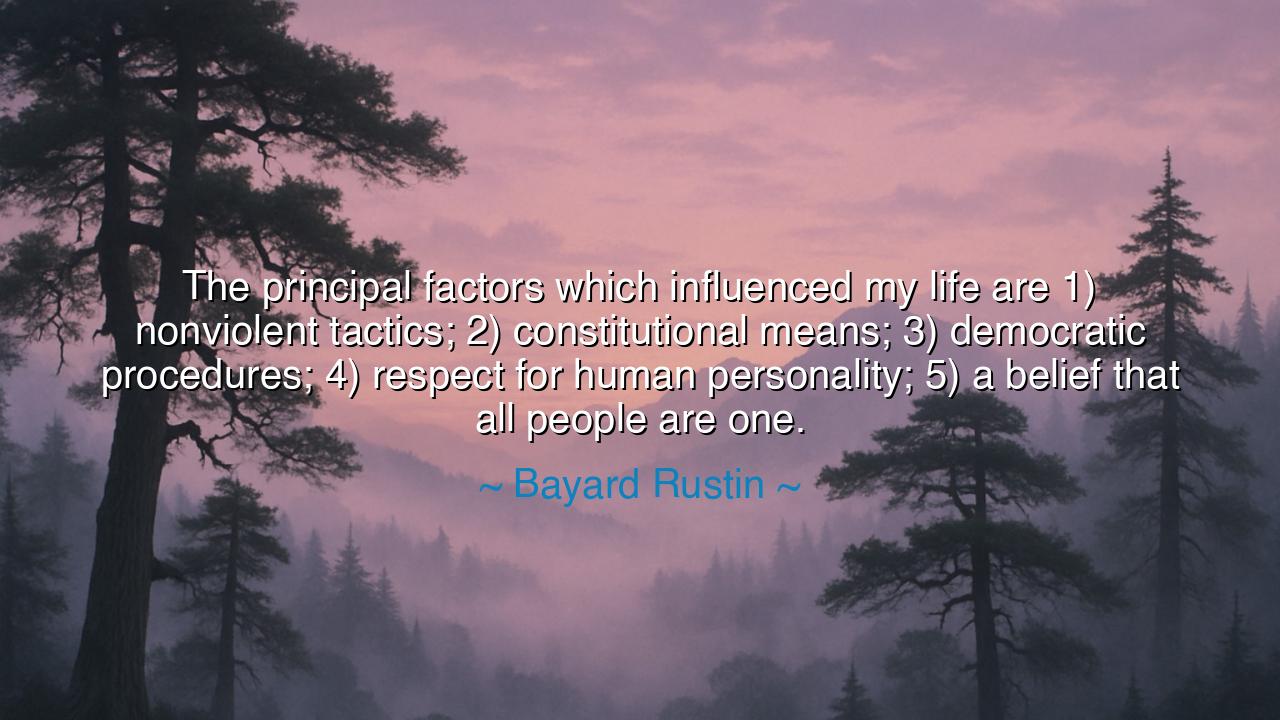
The principal factors which influenced my life are 1) nonviolent
The principal factors which influenced my life are 1) nonviolent tactics; 2) constitutional means; 3) democratic procedures; 4) respect for human personality; 5) a belief that all people are one.






The words of Bayard Rustin—“The principal factors which influenced my life are 1) nonviolent tactics; 2) constitutional means; 3) democratic procedures; 4) respect for human personality; 5) a belief that all people are one—resound with the solemnity of a creed. They are not merely the reflections of a man but the blueprint of a life devoted to justice, carved out through struggle and perseverance. Rustin, though often unseen in the shadows of history, was a master architect of the Civil Rights Movement, and in this statement, he reveals the foundation stones of his work. Like an ancient teacher listing virtues to his disciples, he names the pillars upon which the house of true freedom must be built.
The first is nonviolent tactics. Rustin, a student of Gandhi’s philosophy, believed that violence corrupts even the just cause, turning liberators into oppressors. To him, the sword may win battles, but it cannot win hearts. Only nonviolence, rooted in discipline and courage, can transform enemies into neighbors. The March on Washington, which he helped to organize in 1963, was a living embodiment of this principle: hundreds of thousands gathered in peace, and by their very composure, they shamed the brutality of segregation. This was not weakness but heroic restraint, a moral power greater than any weapon.
Second, he names constitutional means. Rustin understood that the struggle for freedom in America must be waged not outside the law but by appealing to the very promises written in its founding documents. The Constitution declared liberty and equality, even as the nation betrayed those ideals. To use the law to expose its own contradictions was to force America to live up to its highest truth. In this, Rustin echoed the ancients, who taught that the noblest revolutions are those that call a people back to their own best principles, rather than tearing down the order into chaos.
Third comes democratic procedures. Rustin knew that true justice cannot be imposed from above but must be forged through participation, debate, and consent. He believed in organizing, in building coalitions, in teaching ordinary citizens the power of their collective voice. This was not the rule of a few, but the dignity of the many. Like the assemblies of Athens or the councils of tribes, democracy was for Rustin not a convenience but a sacred means, ensuring that freedom was shared and safeguarded by all.
The fourth principle, respect for human personality, strikes at the core of his philosophy. For Rustin, no strategy, no law, no system mattered if it did not uphold the dignity of each individual. Whether Black or white, rich or poor, male or female, gay or straight—every person was to be treated as sacred. This was his moral compass. It recalls the teaching of the Stoics, who declared that all humans share in the divine reason, and the prophets, who cried that each life is precious in the sight of God. Without this respect, all other victories would be hollow.
Finally, he proclaims his belief that all people are one. This is the culmination of his creed. Beyond nations, beyond races, beyond divisions, Rustin affirmed the unity of humanity. It was this vision that gave him the strength to endure scorn, imprisonment, and marginalization, for he knew that his suffering was not his alone but part of a greater struggle for the whole human family. Here we hear echoes of the great voices of history—Jesus, who taught that we are all neighbors; Buddha, who spoke of compassion for all beings; and the poets, who declared that mankind is of one blood.
The lesson for us is clear: to live with integrity is to root our actions in principles that do not waver with circumstance. Let us choose nonviolence in our conflicts, remembering that destruction breeds only more destruction. Let us honor law and democracy, working within them to bend the arc of history toward justice. Let us treat every person with respect, even when it costs us pride or comfort. And let us hold fast to the vision that beyond our differences, all people are one.
Thus, Bayard Rustin’s words stand as both testimony and commandment. They remind us that the fight for justice is not won by might or cunning, but by steadfast devotion to principles that uplift humanity itself. His life whispers across the ages: Stand firm, walk humbly, love deeply, and never forget that your freedom is bound to the freedom of all.






AAdministratorAdministrator
Welcome, honored guests. Please leave a comment, we will respond soon